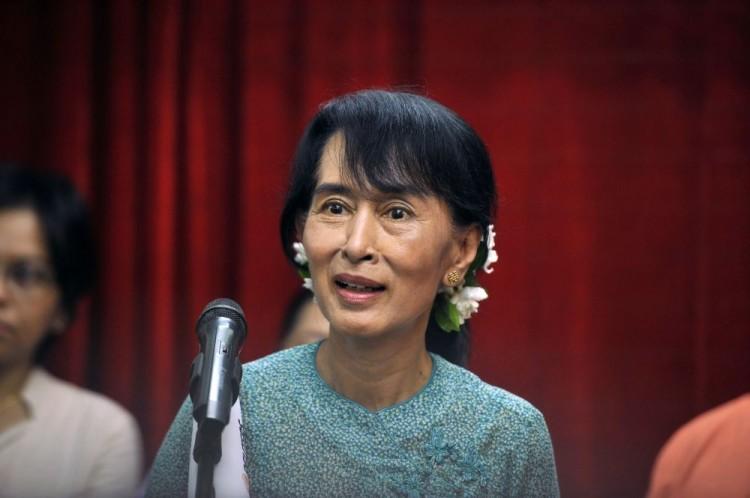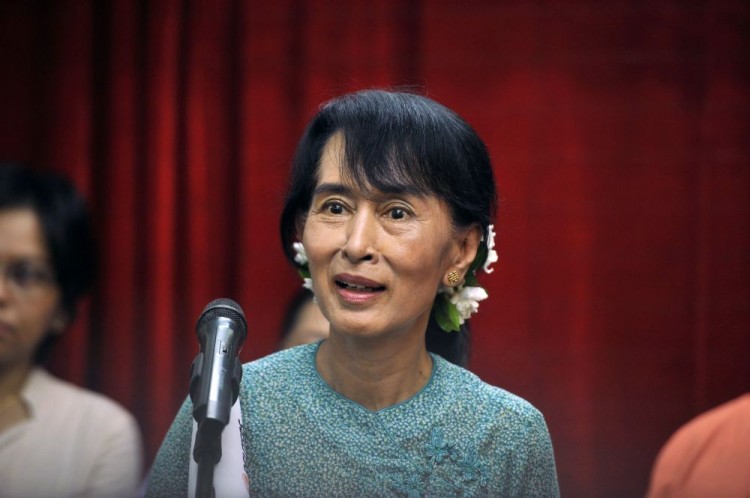Aung San Suu Kyi, the leader of the Burmese opposition National League for Democracy (NLD) party, said on Monday that her party is ending its dispute over the parliamentary oath and will join the Legislature on Wednesday.
NLD supporters and members of Parliament (MPs) from ethnic minority groups in Burma wanted to see the NLD take its seats, The Irrawaddy news magazine reported.
“There are two reasons why we decided to join Parliament,” Suu Kyi said, according to the magazine. “One is we deeply respect the people’s desire who helped us win a majority at the election. These people want to see us in Parliament.”
The other reason, she said, “is to show respect to members of ethnic political parties that are already MPs and who have asked us to join Parliament.”
She added there are numerous problems with the language of the constitution that was drafted by the long-ruling military junta in 2008. The junta ceded power to a quasi-civilian government headed by former general and current President Thein Sein last year.
“This is just a problem regarding the constitution and is not a political conflict,” said Suu Kyi. “We do not create any political conflicts. Therefore, we agreed to join Parliament because we do not want to have any political tension.”
Professor Kanbawza Win, former foreign affairs secretary to the prime minister of Burma during the 1970s and former senior research fellow at the European Institute for Asian Studies, says the move seems to be a good tactical decision by Suu Kyi. “The Burmese struggle is two sides of the coin” with democratic rights and ethnic rights on the two faces.
“She seems to construe that one step backward is needed to make a very good leap forward,” Win said in emailed comments.
Suu Kyi’s party, which won 43 seats in historic by-elections on April 1, took issue with the Burmese parliamentary oath to “safeguard the constitution.” Changing the constitution, which safeguards the position of the military, is one of the chief priorities of the NLD.
With Suu Kyi, arguably the most popular figure inside and outside of Burma, “only time will prove whether she can have an impact on the Parliament as she is very resourceful and popular,” Win said. But, he noted, “it may seem that both the NLD and the West are caught in the junta’s snare and could escape only if they unanimously move together.”
The NLD’s decision comes as United Nations Secretary-General Ban Ki-moon delivered an address to Burma’s Parliament.
“The dramatic changes sweeping [Burma] have inspired the world, and we know that your ambitions for the future reach higher still,” Ban said, adding the once-isolated country “can meet the challenges of reconciliation, democracy, and development, but it will take your full determination and your common leadership and partnership.”
Recently, the European Union lifted most sanctions on Burma and the United States is mulling over the same. In his speech, Ban said there needs to be a further rolling back of sanctions.
Win says that since Ban is from Korea, he understands well “the psyche and rationale of authoritarian regimes,” and how reform can always be reversed.
“[Ban’s] speech eulogizing the Burmese regime, underlies the fact that he is eager to promote more democratic principles in the country, even though he aware of the pitfalls,” says Win.
Most Burmese, on the other hand, are being much more cautious, writes Win. “The people of Burma understand the stance of Ban Ki-moon, but in their heart of hearts want the sanctions to remain until the election of 2015.”






